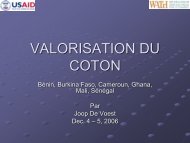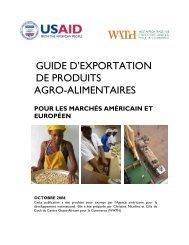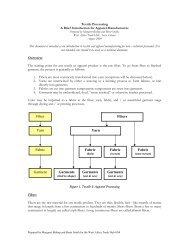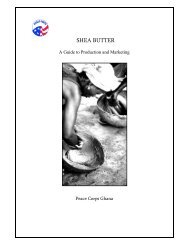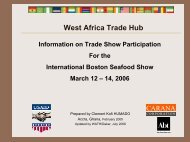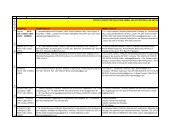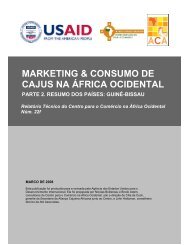A Value Chain Analysis of the Cashew Sector - AGOA Export Toolkit
A Value Chain Analysis of the Cashew Sector - AGOA Export Toolkit
A Value Chain Analysis of the Cashew Sector - AGOA Export Toolkit
Create successful ePaper yourself
Turn your PDF publications into a flip-book with our unique Google optimized e-Paper software.
18<br />
Figure 2.1 <strong>Cashew</strong> <strong>Value</strong> <strong>Chain</strong> Operators and <strong>the</strong>ir Functions<br />
Specific Inputs Production Transformation Commerce / Trade Consumption<br />
ÿ Supply <strong>of</strong> seeds<br />
ÿ Supply <strong>of</strong> agrochemicals<br />
ÿ Supply <strong>of</strong> specifi c<br />
information to<br />
producers<br />
ÿ Supply <strong>of</strong><br />
equipment and<br />
packaging<br />
materials<br />
ÿ Agrochemical<br />
dealers<br />
ÿ Seed dealers<br />
ÿ Equipment/<br />
packaging dealers<br />
ÿ Seed sowing<br />
ÿ Weeding, spraying<br />
ÿ Harvesting<br />
ÿ Sale <strong>of</strong> RCN<br />
ÿ Hiring <strong>of</strong> wage<br />
labourers<br />
ÿ Post-harvest<br />
handling (grading<br />
included)<br />
ÿ Small- and largescale<br />
producers<br />
ÿ Producers’<br />
associations<br />
ÿ Outgrowers<br />
ÿ Seasonal labourers<br />
Functions<br />
ÿ Bulk purchase<br />
<strong>of</strong> RCN<br />
ÿ Sorting<br />
ÿ Cracking, peeling<br />
ÿ Grading, roasting<br />
ÿ Packaging<br />
Participating Actors<br />
ÿ Processors/<br />
entrepreneurs<br />
ÿ Wage labourers<br />
ÿ Roasters<br />
Th e cashew industry in Ghana currently boasts 12 processing<br />
companies with a total installed capacity <strong>of</strong> 2,137 t per year.<br />
Th e only medium processing company is Mim <strong>Cashew</strong> Products<br />
which has an installed capacity <strong>of</strong> 1,000 t per year and,<br />
as <strong>the</strong> name implies, is located in Mim. Th e remainder are<br />
small enterprises with an installed capacity ranging from 10 to<br />
250 t per year. Th ese companies process kernels for export, while<br />
<strong>the</strong> bulk <strong>of</strong> secondary processing takes place around Accra.<br />
Th ere are 21 kernel roasting companies operating in diff erent<br />
parts <strong>of</strong> <strong>the</strong> country. 17 <strong>of</strong> <strong>the</strong>se are to be found in <strong>the</strong><br />
Greater Accra Region, three in <strong>the</strong> Brong-Ahafo Region and<br />
one in <strong>the</strong> Eastern Region. Th e kernels <strong>the</strong>y roast are sold at<br />
hotels, restaurants and supermarkets. Th e “<strong>Cashew</strong> Processing,<br />
Marketing and Consumption in West Africa” (USAID 2007)<br />
study concludes that <strong>the</strong> average retail price <strong>of</strong> locally processed<br />
cashews is highest in Ghana and Côte d’Ivoire –<br />
higher even than that <strong>of</strong> imported Asian cashews. If prices cannot<br />
be reduced signifi cantly, <strong>the</strong> local market for cashews will<br />
be dominated by imports. In addition, Gha na ian producers<br />
do not use all <strong>of</strong> <strong>the</strong> market channels avail able within <strong>the</strong><br />
country eff ectively. As a result, products do not reach all potential<br />
points <strong>of</strong> sale, and potential buyers or sellers (such as<br />
hotels) are underserved.<br />
Distributors: <strong>the</strong>se include local traders, intermediaries,<br />
(agents), retailers and exporters. There are nine local RCN<br />
buyers, plus <strong>the</strong> four foreign companies in operation during <strong>the</strong><br />
2008 harvesting season. Th e agents <strong>of</strong> <strong>the</strong>se companies purchase<br />
RCN by travelling from one marketing centre to ano<strong>the</strong>r and<br />
ÿ Harvesting,<br />
collection and<br />
purchase <strong>of</strong><br />
cashews from<br />
producers<br />
ÿ Post-harvest<br />
handling<br />
ÿ Sale <strong>of</strong> cashews to<br />
exporters/traders<br />
ÿ Payment for<br />
transport<br />
ÿ Agents/traders<br />
ÿ Middlemen<br />
ÿ Wholesalers/retailers<br />
(supermarkets)<br />
ÿ <strong>Export</strong>ers<br />
ÿ Consumption <strong>of</strong><br />
roasted kernels<br />
ÿ Households<br />
(urban, domestic<br />
and export)<br />
ÿ Hotels<br />
ÿ Restaurants<br />
sometimes travel to <strong>the</strong> farming communities <strong>the</strong>mselves.<br />
Agents and traders are responsible for transporting cashews<br />
to ports and pay for <strong>the</strong> related costs. Th ey sell RCN to exporters<br />
directly and, in some cases, to secondary intermediaries<br />
or middlemen.<br />
<strong>Export</strong>ers: <strong>the</strong>se are few in number and operate mostly from<br />
<strong>the</strong> Brong-Ahafo Region, as well as from marketing centres<br />
in o<strong>the</strong>r cashew growing areas <strong>of</strong> Ghana. Th e RCN are collected<br />
in bulk and packed into jute sacks obtained from associations.<br />
Th ese are <strong>the</strong>n transported to Tema harbour, where<br />
<strong>the</strong>y are shipped to target markets such as India and Vietnam.<br />
Consumers: <strong>the</strong> majority <strong>of</strong> consumers buy locally roasted<br />
kernels from supermarkets and o<strong>the</strong>r retailers.<br />
2.2.2 Marketing Channels and <strong>the</strong> Local <strong>Cashew</strong> Trade<br />
Th e diagram that follows depicts <strong>the</strong> marketing channel for<br />
raw cashew nuts produced in Ghana. Only 2% <strong>of</strong> <strong>the</strong>se are<br />
processed locally, while <strong>the</strong> remaining 98% are exported to<br />
India. World prices for cashew kernels fl uctuate, as is particularly<br />
<strong>the</strong> case for raw nuts from Africa. Farm gate prices<br />
reached a peak in 2000, before <strong>the</strong>y collapsed by 50% in<br />
2001. In Ghana, <strong>the</strong> farm gate price for RCN was US$ 0.52<br />
per kg in 2009. Th is compares with <strong>the</strong> price range <strong>of</strong> US$<br />
0.31 per kg to US$ 0.54 per kg identifi ed by a survey <strong>of</strong><br />
three West African countries conducted in 2006. In 2009,<br />
<strong>the</strong> realised sales revenues from cashews in Ghana were:



